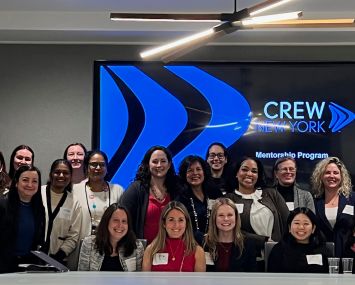Commercial Real Estate’s DEI Initiatives Appear Largely Unscathed — So Far
Federal dictates on corporate diversity have left the industry largely quiet on the subject
By Anna Staropoli February 18, 2025 2:00 pm
reprints
In its first month in office, the Trump administration has made diversity, equity and inclusion efforts in the private sector a prime target. The Justice Department is even considering “criminal investigations” of companies that pursue DEI, according to a Feb. 5 directive from newly appointed U.S. Attorney General Pam Bondi.
The backlash comes nearly five years after America’s 2020 racial reckoning in the wake of the police murder of George Floyd. On the corporate side, what followed was momentum to nurture opportunities for under-represented and marginalized groups. DEI’s fall from political favor marks a turning point across industries, but, despite all the noise, there’s been a stark lack of noise from commercial real estate organizations.
This silence comes in the news, on company websites and via direct emails. Roughly a dozen commercial real estate companies — including brokerages, developers and investment groups — and public relations firms that work with real estate clients declined interview requests about their DEI efforts, including existing programs, or did not respond to Commercial Observer’s requests for comment.
Given that Donald Trump announced his DEI policies not even a month ago, commercial real estate’s silence regarding DEI may merely reflect a cautious pause as the industry adjusts to the new administration. Yet, while it’s too soon to tell how the political narrative will shape any forthcoming stance on diversity, the negative rhetoric surrounding DEI — not unlike real estate’s silence — threatens both the industry’s progress and its opportunities to advance underrepresented talent.
“[DEI] is something that comes up far more regularly, certainly this year, than it has before, and I do hear uncertainty and fear,” said Cindy MacMillan, the Vancouver-based president of CREW Network, a networking organization for women in commercial real estate. “People are on edge because, again, we haven’t seen these sweeping changes from corporations yet, but we have seen it in other industries, and there is fear that that could trickle over to this industry.”
The changes have been far-reaching. In late January, Trump eliminated federal DEI programs, jobs and offices alongside a White House ruling that called for “ending illegal discrimination and restoring merit-based opportunity.” Subsequently, corporate heavy hitters ranging from Disney to Amazon to Google announced DEI rollbacks of their own. Deloitte, Booz Allen Hamilton, Target and Goldman Sachs also disbanded related initiatives.
As of now, MacMillan has seen commercial real estate organizations remain fairly committed to their DEI endeavors, but she believes it’s still too soon to determine how the narrative will impact women in the industry.
Meanwhile, CRE entities such as the Real Estate Board of New York (REBNY) have joined those corporations doubling down on DEI, including McKinsey, J.P. Morgan Chase and Costco.
“REBNY and its members are focused on action and results and building stronger and stronger ties between the industry and the city in which it conducts business,” said Yvonne Riley-Tepie, REBNY’s senior vice president of social impact, told Commercial Observer via email. “REBNY members and staff support efforts to make the real estate industry more reflective of the city it serves — the world’s best.”
She cited REBNY’s investments in, and support for, mentorship and student internship programs, including the Summer Youth Employment Program, REBNY Fellows and Building Skills NY. REBNY is also focused on improving supplier diversity resources and relationships, including partnering with nongovernmental organizations for projects oriented toward making an impact socially.
A variety of commercial real estate firms have established similar initiatives through designated DEI departments and DEI leaders. For example, CBRE lists $2 billion spent in 2023 with diverse suppliers, while JLL outlines a slew of business resource groups designed to give a platform to diverse voices. Ownership firms such as Tishman Speyer also appointed their first-ever heads of diversity in recent years.
The DEI backlash from other corporations, therefore, has the potential to materialize in commercial real estate in a number of ways. These range from the dramatic — eliminating DEI programs altogether — to the subtle. Some CREW members have stopped receiving funding for membership dues from their organizations, MacMillan acknowledged, with the caveat that those members are the minority. “But it is starting to trickle up, and so we could see more of that.”
Other risks include the loss of support within a company via professional development initiatives and mentors, MacMillan said. Funding for DEI-associated programs, likewise, may be reversed or restricted.
Yet, even if a real estate company doesn’t change or limit its DEI policies, the consensus surrounding the framework and its politicization has the potential to inhibit progress and undermine the obstacles the industry has worked to remove.
“It’s going to raise more of these barriers that we’ve been working hard to reduce over the last many years,” said MacMillan. “But I think the tone of the language used around it — it feels like an outright attack against all types of diversity, equity and inclusion.”
For example, if a corporation reassessing its DEI initiatives labels a group like CREW as a “DEI organization,” CREW may experience unfair backlash resulting in criticism or a lack of support, said MacMillan. Likewise, questions about how they earned their corporate positions might dog underrepresented employees and leaders.
For now, the consensus remains at a standstill, as the majority of commercial real estate firms have yet to make any splashy moves regarding their existing DEI efforts or publicly respond to Trump’s rhetoric the way industries such as finance and technology have. For some real estate firms, silence regarding DEI could be the product of geography. Many major real estate-related companies are globally oriented — or simply not headquartered in the U.S.
However, real estate’s silence speaks volumes when compared to 2020’s DEI promises, when many — if not most — companies were outspoken in their commitments. In turn, they established DEI leadership positions, firm-wide initiatives and mentorship programs, many with benchmarks for diversifying their workforces.
The reticence of many firms to comment for this story didn’t surprise MacMillan, who acknowledges the current vilification of DEI efforts and organizations’ hesitations to come under fire. Not all firms have stayed entirely silent, however, and some allow their existing programs to speak for themselves.
“As a company that is powered by people, we are committed to increasing diversity within our walls and in the industry,” a spokesperson for Avison Young said in a statement emailed to CO. (While the brokerage services firm declined an interview request, the statement issued for this article was a rarity among its peers.)
According to CREW’s research, Avison Young has delivered thus far on its commitments. From 2021 to 2024, the Toronto-based firm increased its global percentage of women employees from 37 percent to 41 percent.
Reports published by other firms and organizations reflect similar goals and incremental successes. A CREW study assessed data between 2015 and 2020 and found the compensation pay gap between men and women had shrunk from 2015’s 23.3 percent to 2020’s 10.2 percent.
Within that same span, there was likewise a 5.4 percent increase in the number of women aspiring for higher, more senior-level positions.
“Diversity makes good business sense,” said REBNY’s Riley-Tepie. “Members report that DEI initiatives produce more well-rounded and agile teams, are key for understanding the demands of public officials and community stakeholders, and are increasingly expected to do business with a wide range of investors.”
More than 70 percent of REBNY’s staff is female and more than 30 percent are people of color, said Riley-Tepie. Likewise, a Cushman & Wakfield report showed that 27 percent of that firm’s new hires in 2022 were women, while a year later that percentage grew to 42 percent. Savills also saw an increase in female representation in 2023, with 53 percent of the company’s workforce women, per Savills’ yearly DEI report. However, that data simultaneously highlights a resoundingly white workforce comprising 85 percent of all employees.
Indeed, not all data has proven positive, showing the progress DEI initiatives have yet to account for. From 2015 to 2020, women held only 9 percent of higher-level commercial real estate positions, per CREW’s study. Meanwhile, some 24 percent left their jobs during the pandemic, due in part to a decline in access to professional development opportunities, said MacMillan.
Whether they demonstrate successes or gaps in diversifying real estate, designated DEI reports allow real estate to track its progress, outlining the potential of DEI initiatives and publishing more data than in years prior. In fact, in 2024, a survey assessing global real estate firms’ DEI efforts found that 96 percent of commercial real estate firms globally had DEI strategies.
This, MacMillan said, is a strength of DEI efforts in the U.S. and one contrary to the current narrative: The last few years have seen American organizations increasingly open and receptive to creating a diverse workforce.
In fact, she believes commercial real estate has done a great job improving the recruitment and retention of women. More women have been promoted to more senior roles more regularly, which she attributes in part to increased awareness via the likes of research papers, industry briefs and bias training over the last decade.
As part of real estate’s overarching attempts to diversify the workforce, a few additional trends have emerged, presenting benchmarks to check the pulse of the industry’s DEI successes. Specifically, resource opportunities and mentorship programs, both for current employees and up-and-coming leaders, have proved valuable.
On the mentorship side, initiatives such as REBNY’s, as well as Project Destined and Presidio Bay Ventures’ summer program, have provided young, underrepresented talent with a mentorship framework to gain access to the industry. Many such programs are growing, too, adding more partners and thereby more opportunities.
Meanwhile, in its statement, Avison Young highlighted employee resource groups (ERGs) as a way to aid historically underrepresented groups. Such groups “are important to enhancing career development and reflect the Avison Young culture where people can come together based on shared characteristics and life experiences,” per the statement.
Similarly, CREW Network aims to increase mentorship and networking opportunities for its members, especially in light of the current political pushback. MacMillan highlighted the importance of assuring CREW’s members that they can access the network for business opportunities and career development.
“There have been improvements in recent years, but more needs to be done,” said Riley-Tepie, pointing to REBNY members who, like those in CREW, are looking to the organization to support the recruitment and retention of a diverse workforce.
While DEI efforts remain pivotal now, given the moves in Washington and the fluctuating state of DEI in real estate, they don’t necessarily require any new strategy or approach. After all, CREW has been around for decades with the same mission to advocate for women and offer career support, said MacMillan.
“We’re going to continue to create awareness around any disparities. We’re going to continue to champion women who are in senior roles — and you can’t be what you can’t see,” she said.
That’s regardless of the colder corporate climate for DEI. “I know that our membership and our chapter leaders are certainly looking to CREW Network for a response,” said MacMillan. “And the answer is: We’re not doing anything differently.”
Anna Staropoli can be reached at astaropoli@commercialobserver.com.



